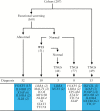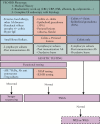Diagnostic Yield of Next-generation Sequencing in Very Early-onset Inflammatory Bowel Diseases: A Multicentre Study
- PMID: 29788237
- PMCID: PMC6113703
- DOI: 10.1093/ecco-jcc/jjy068
Diagnostic Yield of Next-generation Sequencing in Very Early-onset Inflammatory Bowel Diseases: A Multicentre Study
Erratum in
-
Corrigendum to: Diagnostic Yield of Next-Generation Sequencing in Very Early-Onset Inflammatory Bowel Diseases: A Multicenter Study.J Crohns Colitis. 2021 Mar 5;15(3):517-518. doi: 10.1093/ecco-jcc/jjaa164. J Crohns Colitis. 2021. PMID: 32895718 Free PMC article. No abstract available.
Abstract
Background and aims: An expanding number of monogenic defects have been identified as causative of severe forms of very early-onset inflammatory bowel diseases [VEO-IBD]. The present study aimed at defining how next-generation sequencing [NGS] methods can be used to improve identification of known molecular diagnosis and to adapt treatment.
Methods: A total of 207 children were recruited in 45 paediatric centres through an international collaborative network [ESPGHAN GENIUS working group] with a clinical presentation of severe VEO-IBD [n = 185] or an anamnesis suggestive of a monogenic disorder [n = 22]. Patients were divided at inclusion into three phenotypic subsets: predominantly small bowel inflammation, colitis with perianal lesions, and colitis only. Methods to obtain molecular diagnosis included functional tests followed by specific Sanger sequencing, custom-made targeted NGS, and in selected cases whole exome sequencing [WES] of parents-child trios. Genetic findings were validated clinically and/or functionally.
Results: Molecular diagnosis was achieved in 66/207 children [32%]: 61% with small bowel inflammation, 39% with colitis and perianal lesions, and 18% with colitis only. Targeted NGS pinpointed gene mutations causative of atypical presentations, and identified large exonic copy number variations previously missed by WES.
Conclusions: Our results lead us to propose an optimised diagnostic strategy to identify known monogenic causes of severe IBD.
Keywords: Genetics and molecular epidemiology; TNGS; VEO-IBD; monogenic disorders; paediatrics.
© The Author(s) 2018. Published by Oxford University Press on behalf of European Crohn’s and Colitis Organisation.
Figures


References
-
- Kammermeier J, Drury S, James CT, et al. . Targeted gene panel sequencing in children with very early onset inflammatory bowel disease – evaluation and prospective analysis. J Med Genet 2014;51:748–55. - PubMed
-
- Picard C, Fischer A. Contribution of high-throughput DNA sequencing to the study of primary immunodeficiencies. Eur J Immunol 2014;44:2854–61. - PubMed
-
- Uhlig HH. Monogenic diseases associated with intestinal inflammation: implications for the understanding of inflammatory bowel disease. Gut 2013;62:1795–805. - PubMed
-
- Glocker EO, Frede N, Perro M, et al. . Infant colitis – it’s in the genes. Lancet 2010;376:1272. - PubMed
Publication types
MeSH terms
Grants and funding
LinkOut - more resources
Full Text Sources
Other Literature Sources

